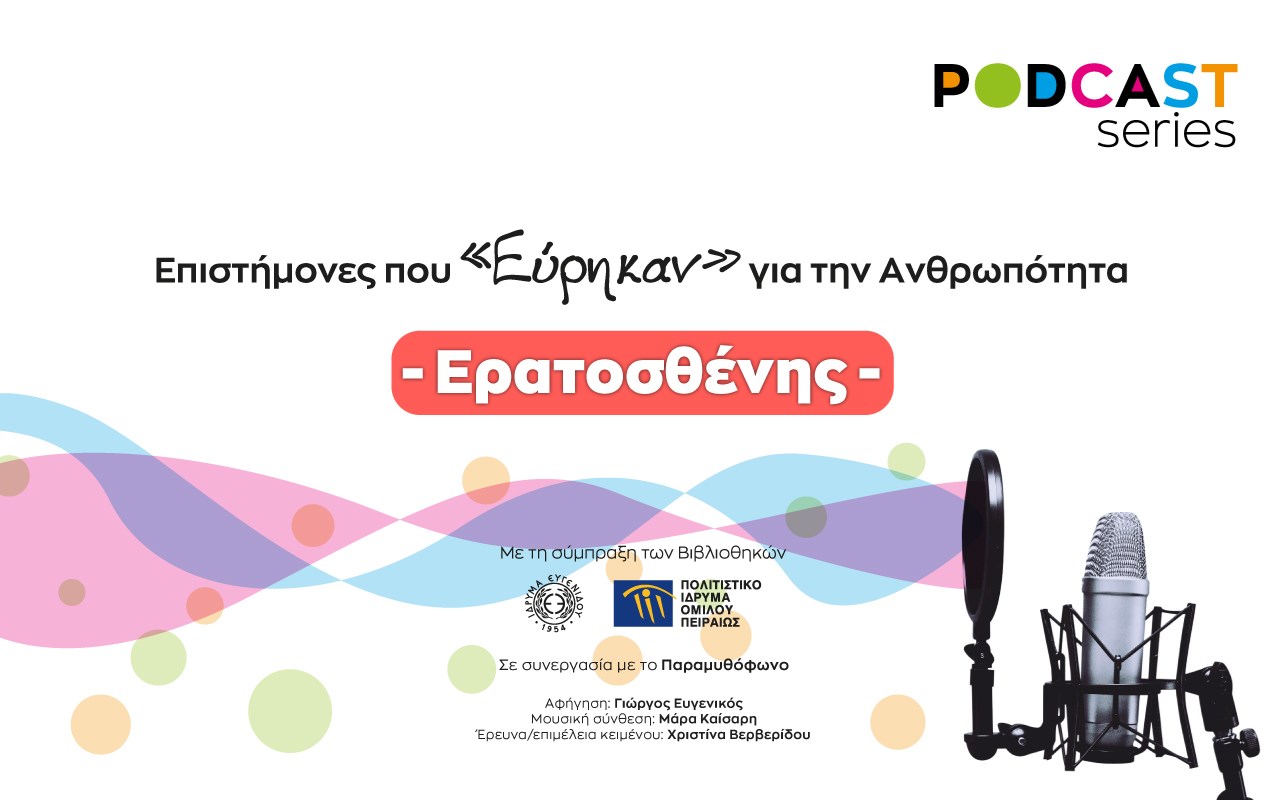Scientists who “Eurikan” for the humanity: Eratosthenes

The second episode of "Scientists who “Eurikan”[1] for the humanity" series is based on the life of Eratosthenes, the eminent mathematician and renowned astronomer and geographer, a remarkable geodesist, and a great orator of antiquity, who for about 40 years was the Director of the famous Library of Alexandria. He is considered the founder of mathematical and astronomical geography. He was one of the first to use astronomical observations in determining various distances and in drawing up geographical maps. He also constructed a coordinate system with parallels and meridians. Using an original mathematical method, he was able to measure the circumference of the Earth. This is one of the most important experiments carried out in the history of mankind.
PLOT OF THE STORY
The story begins in the largest library of the time, that of Alexandria, where Eratosthenes is Director. There, Eratosthenes, a man with a great thirst for knowledge and a seeker of truth, reads and learns about the Earth and the world, gathering all the wealth that the books in a library can give him.
In the next scene, a man from Syene visits the library. He ‒through an invented dialogue‒ informs Eratosthenes of a "magic well" in which, on a certain day of the year, the entire Sun appears.
It's the moment when Eratosthenes is inspired by his experiment to measure the circumference of the Earth. What follows is an explanation of his thinking, his experiment, and his discoveries in simple terms.
The story concludes with Eratosthenes in the great library, feeling proud because he managed to contribute with his writing to the library he so much admired.
Narration: George Eugenikos
Music composition: Mara Kaisari
Research-Text Editing: Christina Ververidou
Duration: 16' and 28"
You can listen and/or download the podcast from the Eugenides Foundation's Spotify channel HERE.
[1] Found
BIBLIOGRAPHY
Bonnard, Andre. (1991). Ο Αρχαίος Ελληνικός πολιτισμός: από τον Ευριπίδη στην Αλεξάνδρεια. 4η έκδ. Αθήνα: Θεμέλιο
Bunt, Lucas N. & Jones, Phillip S. (1981). Οι ιστορικές ρίζες των στοιχειωδών μαθηματικών. Αθήνα: Πνευματικός Γ.Α.
Canfora, Luciano. (1989). Η χαμένη βιβλιοθήκη της Αλεξάνδρειας. Αθήνα: Αλεξάνδρεια
Dunham, William. (2013). Τα μεγάλα θεωρήματα των μαθηματικών: ένα ταξίδι στη μεγαλοφυΐα. Αθήνα: Αλεξάνδρεια
El-Abbadi, Mostafa. (1998). Η αρχαία βιβλιοθήκη της Αλεξάνδρειας: η ζωή και η μοίρα της. Αθήνα: Σμίλη
Flower, Derek-Adie. (2002). Στις όχθες της σοφίας : η ιστορία της αρχαίας βιβλιοθήκης της Αλεξάνδρειας. Αθήνα: Λιβάνης Α.Α.
Loria, Gino (1971). Ιστορία των μαθηματικών. Αθήνα: Ελληνική Μαθηματική Εταιρεία
Mankiewicz, Richard (2002). Η ιστορία των μαθηματικών. Αθήνα: Αλεξάνδρεια
Αναπολιτάνος, Διονύσιος Α. & Καρασμάνης, Βασίλης (επιμ.). (1993). Αρχαία ελληνικά μαθηματικά: κείμενα ιστορίας και φιλοσοφίας. Αθήνα: Τροχαλία
Αρχιμήδης. (2001). Άπαντα. τ. 4.: Στομάχιον, περί των μηχανικών θεωρημάτων προς Ερατοσθένην έφοδος, βιβλίον λημμάτων, πρόβλημα βοεικόν (Φιλολογική Ομάδα Κάκτου, Μτφρ). Αθήνα: Κάκτος. (Αρχαία ελληνική γραμματεία, 771-774, 1204-1205)
Γεωργακόπουλος, Κωνσταντίνος. (1995). Αρχαίοι Έλληνες θετικοί επιστήμονες. Αθήνα: Γεωργιάδης Α.
Νατσούλης, Τάκης. (1996). Αρχαίο ελληνικό πνεύμα: ανέκδοτα - γνωμικά - παροιμίες - ευτράπελα - διάφορα ανάλεκτα και στιγμιότυπα από τη ζωή των αρχαίων Ελλήνων σοφών. Αθήνα: Νέα Θέσις
Σπανδάγος, Βαγγέλης, K., Σπανδάγου, Ρούλα & Τραυλού, Δέσποινα. (1994). Οι μαθηματικοί της Αρχαίας Ελλάδας: βιογραφικά στοιχεία και εργασίες των μαθηματικών της Αρχαίας Ελλάδας από το 900 π.Χ. έως το 550 μ.Χ. Αθήνα: Αίθρα
Σταμάτης, Ευάγγελος Σ. (1968). Η Ελληνική επιστήμη. Αθήνα: χ.ό.
Στράβων. (1994). Γεωγραφικά. τ. 1: Εισαγωγή κριτική στον Ερατοσθένη (Π. Θεοδωρίδης, Μτφρ. & Β. Μανδηλαράς, Επιμ.). Αθήνα: Κάκτος. (Αρχαία ελληνική γραμματεία, 240-256).
Χριστιανίδης, Γιάννης (2003). Θέματα από την ιστορία των μαθηματικών: Αιγυπτιακά, Βαβυλωνιακά και Ελληνικά μαθηματικά. Ηράκλειο: Πανεπιστημιακές Εκδόσεις Κρήτης
Χριστόπουλος, Γεώργιος Α., & Μπαστιάς, Ιωάννης Κ. (επιμ.). (1990). Παγκόσμιο βιογραφικό λεξικό. Αθήνα: Εκδοτική Αθηνών. Τόμ. 4


